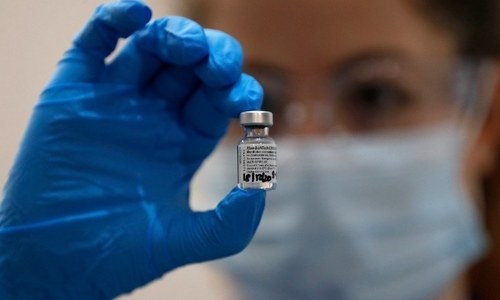The Ministry of National Health Services (NHS), responding to letter by Transparency International Pakistan (TIP), on Wednesday said the federal government's decision to allow private imports of Covid-19 vaccines was a "deliberate policy tool".
NHS Secretary Aamir Ashraf Khawaja, in the letter, said the government allowed private imports so those population segments which were not part of the government's priority inoculation campaign could be catered to.
"It was a well concerned decision of the federal government to allow the private sector to import vaccine as the national vaccination priorities favoured the healthcare workers and the elderly, involving some lag in reaching other segments of the society."
Khawaja said in the letter that initially there had been no prices set for the imported vaccines since there was no reference price available according to the law but later, a provision of the Drug Pricing Policy under was applied to Covid vaccines "to keep a check on prices instead of leaving it solely to free market dynamics".
"It may be added that the government is fixing the maximum retail price," Khawaja said in the letter, adding that this meant competition and free market dynamics could potentially reduce the price from the maximum retail price.
The government's response comes two days after Transparency International Pakistan, in a letter penned by Justice (r) Nasira Iqbal, had asked the prime minister to review the policy of allowing private imports and cancel it altogether, as across the globe, governments were procuring vaccines and administering it to their citizens for free.
The TIP letter had noted that Pakistan being one of the first countries to allow the private sector to import and sell Covid-19 vaccines would provide a window of corruption as there were possibilities that the government’s vaccines would be sold to private hospitals.
It further said that the government had set a maximum price for two doses of the Sputnik-V vaccine at Rs8,449 while the global price set for it is $10 per dose, which means two doses of Sputnik-V are available at $20 around the world.
The price in Pakistan, according to TIP, should be around Rs1500 but the one set by the government is "more than 150 per cent higher than international prices". The letter also pointed out that the same vaccine was priced at "less than INR 734" in India.
Elaborating further on the government's decision, Khawaja said economics of scale were not available to private importers and small players as they were to the government and international organisations, which he said usually purchased vaccines in millions.
"It is not easy for small players to access small number of vaccines," the letter said, adding: "Whatever number of doses they [private and small importers] can bring in, means potentially saving lives.
"Pakistan remains committed to fighting Covid with everything available at its disposal," Khawaja said, citing increased testing, equipping healthcare facilities and rolling out the vaccination campaign.
Private vaccine imports
Pakistan received its first consignment of privately imported Covid-19 vaccine in Karachi on March 17. The vaccine was Russia's Sputnik V vaccine.
The Drug Regulatory Authority of Pakistan in January 2021 had given a go-ahead to a local pharmaceutical firm, AGP, to import and distribute the Russian-developed Sputnik V. The company had said it would distribute 50,000 doses of Sputnik V to large hospitals and institutions for administration to people who could afford the jab.
















































